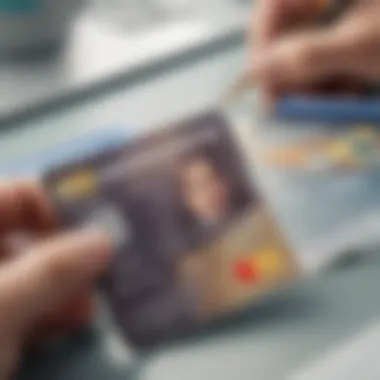Overcoming Credit Hurdles: Getting a Card with Bad Credit


Intro
Navigating the world of credit can be a daunting task, especially if you're managing the weight of a poor credit score. This experience often leaves individuals feeling like they've hit a brick wall when they try to secure a credit card. Understanding credit scores and the avenues available for individuals with less-than-ideal credit can pave the way for a more stable financial future.
Credit scores don’t just determine the approval for loans and credit cards; they shape the overall financial landscape for consumers. A low score can limit options and increase interest rates, leading to a cycle that feels hard to escape. However, with the right knowledge and strategies, you can turn the tide in your favor.
This journey isn’t merely about obtaining a credit card; it’s about regaining control over your financial health. The importance lies not just in the card itself but in the opportunities it can unlock—for instance, the potential to build a positive credit history and the chance to engage in better financial products in the future.
Before diving into how to secure a credit card with a poor credit score, it's crucial to understand some key terminology that influences your journey.
Understanding Credit Scores
Understanding credit scores is crucial for anyone navigating the tricky waters of financial management, especially for those grappling with low scores. Credit scores, at their core, serve as a numerical representation of a person’s creditworthiness. When you apply for a credit card or loan, lenders evaluate your score to determine whether to approve your application, how much credit to extend, and the interest rates you’ll face. For individuals with poor credit, understanding these numbers becomes not just essential but imperative. It’s akin to knowing the lay of the land before embarking on a journey; it helps make better decisions.
Defining a Credit Score
A credit score typically hovers between 300 and 850, with higher scores indicating lower risk for lenders. Scores under 580 are usually categorized as poor. Many factors contribute to this number, making it far more than a mere figure; it creatively weaves a narrative about spending habits, payment histories, and other behaviors related to credit. A useful way to think about it is as a report card for financial responsibility. Every late payment, every missed bill contributes to this grade.
Factors Influencing Credit Scores
Several elements play a role in determining one’s credit score:
- Payment History: This is the biggest factor, accounting for about 35% of your score. Timely payments boost your score, while missed payments can set it back.
- Credit Utilization Ratio: How much credit you use compared to your total available credit; ideally, aim to keep it below 30%.
- Length of Credit History: Older accounts can positively impact your score, showcasing longevity and reliability in managing credit.
- Types of Credit in Use: A diverse mix of credit types, such as credit cards, auto loans, or mortgages, can be beneficial.
- Recent Credit Inquiries: Each time you apply for credit, a hard inquiry is recorded. Too many inquiries in a short period can negatively affect your score.
Impacts of a Low Credit Score
Having a low credit score can feel like holding a rusted keychain to financial opportunities. The consequences can be wide-ranging:
- Higher Interest Rates: Lenders see you as a risk and compensate for that with increased rates.
- Limited Credit Options: Many prime credit cards and loans will be out of reach.
- Security Deposits Required: For certain services, like utilities or mobile contracts, a low score might mean you need to put down a deposit.
- Insurance Premiums: Some insurance companies also look at credit scores, and those with poor scores may face higher premiums.
Understanding the ins and outs of credit scores is essential. It’s the starting point for anyone looking to navigate the complexities of securing a credit card with a less-than-stellar credit history.
Assessing Your Financial Situation
Understanding where you stand financially is a critical part of the journey in applying for a credit card, especially with a less-than-stellar score. Knowing your financial situation— what debts you have, how stable your income is, and understanding your expenses— plays a pivotal role in establishing a solid strategy for securing credit. Without this insight, you could just be shooting in the dark, missing opportunities for better terms, or even risking denial due to overlooked obligations or lack of preparedness.
Evaluating Existing Debts
Before diving headfirst into obtaining a credit card, it makes sense to take a good, hard look at what you owe. Evaluating your existing debts refers to making a thorough assessment of all your obligations, whether they be loans, credit cards, or medical bills. This analysis provides not only clarity but also crucial context when you’re considering applying for a new credit card.
Why is this important? By understanding your debts:
- You can gauge your debt-to-income ratio, an important factor lenders consider.
- Recognizing which debts are urgent can help in prioritizing payments.
- It allows you to identify patterns in your spending behavior that may need adjustment.
Having a clear picture of your debt can make it easier to choose credit cards suited to your situation. For example, if you find yourself buried under higher-interest debts, opting for a secured credit card may make more sense than a subprime card that could further complicate your finances.
Determining Income Stability
Next up, income stability plays a huge role in your credit application process. Lenders are not only interested in your credit score but also how consistent and substantial your income is. If you’re stuck in a job where paycheck stability is shaky, it might raise a red flag for potential creditors.
To assess your income stability, consider the following:
- Length of employment: How long have you been with your current employer?
- Sources of income: Are you relying solely on one job or do you have multiple streams?
- Trends in income: Over the past few months, has your income been steady, decreasing, or increasing?
These factors can provide insights into how likely you are to manage monthly payments on a new credit card. A solid, dependable income can also help you negotiate better terms and possibly access cards with lower interest rates.
Understanding Expenses
The next piece of the puzzle is understanding your expenses. This entails not only looking at fixed costs like rent or mortgage and utilities but also variable expenses such as groceries, entertainment and even occasional splurges. It’s easy to overlook little expenses, but they add up quick, especially in tight financial situations.
To get a clear picture of your expenses:
- Keep a monthly budget to track your spending habit.
- Identify essential and non-essential expenses to see what can be trimmed.
- Review any subscriptions or services that might be draining your resources without adding much value.
“To manage debts effectively, it’s essential to be aware of where your money is going. Financial health is more than just income; it’s about making smart decisions with what you earn.”
Taking stock of your expenses helps you understand your monthly cash flow. Knowing your expenses ensures that you choose a credit card that fits into your budget, making it easier to uphold timely payments. It's a lot easier to navigate through the credit card maze once you have a firm handle on what you can and can't afford.
By combining evaluations of your debts, income stability, and expenses, you empower yourself with the knowledge necessary to make informed decisions in securing a credit card despite a low credit score. It’s about arming yourself with more than just a credit report; it’s about having your financial life in order.


Exploring Credit Card Options
When it comes to acquiring a credit card with a less than stellar credit score, the options available can seem as limited as a one-horse town. It’s paramount to explore the different types of credit cards out there. Not only do certain cards cater specifically to individuals with poor credit, but they also offer distinct benefits and features that can facilitate the journey to financial recovery. Understanding these options is crucial, as it can help choose the right product that aligns with individual circumstances and needs.
Secured Credit Cards
Secured credit cards can be a game changer for anyone looking to rebuild their credit. The principle is straightforward: a small cash deposit is required, which acts as collateral and sets your credit limit. This way, the lender has some assurance, and you can show that you're responsible with credit usage. One significant benefit is that timely payments are reported to credit bureaus, aiding in the uplift of your credit score over time. It's like planting a tree and watching it grow—slow, but steady progress.
- Pros of Secured Credit Cards:
- Easier approval for individuals with low credit scores
- Helps in building or rebuilding credit history
- Can lead to transitioning to an unsecured card later.
However, it’s critical to keep an eye on the fees associated with these cards. Some may have annual fees or other charges that could eat into your budget. Always read the fine print; understanding these costs can help avoid pitfalls.
Subprime Credit Cards
Subprime credit cards are another path worth considering. They are specifically designed for those with poor credit histories, and while they may come with higher interest rates and fees, they can also be a stepping stone to better financial health. These cards often extend credit to individuals who may be deemed risky by traditional lenders, providing a fresh start.
- Key Features of Subprime Credit Cards:
- Higher interest rates, reflecting perceived risk
- Potential for lower credit limits
- May offer perks like cashback or rewards for responsible use.
While using a subprime card, it's vital to remain vigilant about spending and repayment habits. The high-interest rates can quickly become a financial burden if not managed properly. Think of it as walking a tightrope—balance is essential.
Credit Builder Loans
Though not a credit card in the traditional sense, credit builder loans play a significant role in improving credit scores for those who struggle. How it works is simple: you borrow a small amount, which is held in a secured account, and make regular payments. Once the loan term ends, you get the money back, but more importantly, you’ve established a history of on-time payments.
- Benefits of Credit Builder Loans:
- Focused specifically on building credit
- Funds are typically released upon completion of the loan term
- Helps cultivate a sense of financial discipline.
In essence, credit builder loans are more than just a means to an end; they encourage responsible financial behavior, providing invaluable lessons along the way.
"Improving your credit doesn’t happen overnight; it’s often a marathon rather than a sprint."
Improving Approval Chances
When you're faced with a less-than-stellar credit score, securing a credit card can feel like trying to catch smoke with your bare hands. Improving your chances of approval isn’t just about filling out an application; it demands a multifaceted approach. By understanding the various elements involved in the approval process, you can tailor your strategy effectively.
Higher approval rates can significantly benefit your long-term financial health. Securing a credit card, even with a poor credit score, can play a crucial role in rebuilding your credit history and regaining financial stability. This is where the rubber meets the road for many individuals. By enhancing your chances of being approved, you not only gain access to credit but also the opportunity to demonstrate responsible usage, which can, in turn, improve your credit score over time.
Researching Lenders
Not all lenders view poor credit equally. The first step in your pursuit of a credit card is to do some homework on potential lenders. Different banks, credit unions, and online lenders have varying criteria for approval. Some specialize in helping individuals with low credit scores and might offer more favorable terms compared to mainstream banks.
When researching, consider the following:
- Read Reviews: Customer feedback can provide insight into the lender's practices and the experiences of others with similar credit challenges. Look at what previous or current clients are saying online, particularly on platforms like Reddit and Facebook.
- Compare Offers: Create a list and compare annual fees, interest rates, and rewards programs. Some cards may seem more enticing but come with hidden fees that can bite you later.
- Contacting Lenders Directly: Sometimes, a direct contact can clarify specific requirements or flexibility in their approval process. It would not hurt to ask questions that could impact your decision.
Pre-qualification Options
Before submitting a full application, many lenders offer pre-qualification tools. This is a valuable resource as it allows you to gauge your chances of acceptance without triggering a hard inquiry on your credit report. A hard inquiry can temporarily lower your credit score, which is something you want to avoid when your goal is to improve your overall financial standing.
Here’s how to make the most of pre-qualification:
- Soft Inquiry: Pre-qualifying generally involves a soft inquiry, which means it won't impact your credit score. This is a low-risk way to assess where you stand.
- Understand Offers: If you receive pre-qualified offers, read the fine print thoroughly. Eligibility does not guarantee final approval, as lenders will still review your full credit profile.
- Use Multiple Lenders: Don’t hesitate to try several institutions. One lender’s criteria may be more lenient than another’s, so cast a wide net.
Building Credit Responsibly
Once you secure a credit card, your focus should shift to building credit responsibly. This is the crux of improving your credit in the long run. The choices you make after obtaining the card can greatly affect your credit score.
To foster positive credit habits, consider these strategies:
- Make Payments On Time: This is non-negotiable. Late payments can severely damage your credit standing. Set up automatic payments if possible, so you always pay on time.
- Maintain Low Balances: Keep your credit utilization ratio low, ideally under 30%. If you max out your card regularly, it can be a red flag for lenders.
- Diversify Your Credit: As your situation improves, responsibly take on different types of credit. This could mean applying for a small personal loan or a car loan as you gain trustworthiness.
"Building credit is a marathon, not a sprint. Consistency pays off over time."
Striking the right balance between diligence and strategic planning is crucial when improving your credit prospects. Be thoughtful about your choices, and ensure every step taken is aimed toward fostering responsible credit behavior.


Submitting Your Application
Submitting an application for a credit card is a pivotal step for those grappling with a poor credit score. This part of the process can often feel like walking a tightrope, balancing the hope for a fresh start with the gravity of previous financial missteps. The importance of this section lies in the meticulous approach needed to maximize approval chances and pave the way towards rebuilding financial credibility.
Gathering Necessary Documents
Before hitting the 'apply' button, it is crucial to gather all necessary documentation. This isn't just about checking boxes; it lays the groundwork for a solid application. Here’s a rundown of what you might need:
- Identification: Valid government-issued ID, such as a passport or driver's license.
- Proof of Income: Recent pay stubs, tax returns, or bank statements can validate your financial situation.
- Residency Status: Utility bills or lease agreements serve to prove your current address.
Having these documents handy not only streamlines the application process but also demonstrates to lenders that you are organized and serious about your financial commitments. Organizing your paperwork in advance can make the application feel less overwhelming.
Completing the Application Process
Once your documents are in order, the next leg of the journey is actually filling out the application form. This part involves providing accurate personal details and financial information, which may include:
- Personal Information: Full name, social security number, and contact information.
- Financial Details: Income level, employment status, and month-to-month expenses.
It’s tempting to rush through this process, but take your time. Errors in this part can raise red flags for lenders. Furthermore, be prepared to explain any negative items in your credit report—transparency can go a long way in establishing trust. After submission, ensure you keep copies of your application and submitted documents. They can be valuable for future applications or inquiries.
Understanding Application Approval Timeline
Finally, one must grasp the timeline of the approval process. Typically, the waiting game could stretch from a few minutes to several weeks, depending on various factors:
- Instant Approval: Some issuers provide an almost immediate decision, especially for secured credit cards.
- Under Review: If your application requires further verification, you'll likely receive a notice that the process is under review.
- Communication: Be sure to check your email or phone for updates. Some lenders might reach out for additional information.
Patience is a virtue here; understanding the timeline helps to manage expectations and reduce anxiety.
Managing Your New Credit Card
When it comes to navigating the often tumultuous waters of personal finance, managing your new credit card can be a turning point for many individuals seeking to rebuild their credit. Having a credit card in your pocket, especially after facing challenges due to a low credit score, brings the responsibility of ensuring it works for you — not the other way around.
Bad credit isn't just a number; it can shape your financial future in drastic ways. By properly managing a new credit card, you begin to change the narrative. You pave the way to improving your score, enhancing your purchasing power, and ultimately regaining your financial health.
Making Timely Payments
One of the most crucial aspects of managing your credit card is making timely payments. This is non-negotiable. Late payments not only incur fees, but they can have lasting impacts on your credit score.
A good practice is to set reminders through your mobile phone or calendar app. Furthermore, many credit card companies offer features like automatic payments. Adjusting the payment date to coincide with your paycheck can make it easier to stay on top of payments. For someone working to improve their credit, missing a payment could feel like a step back.
Keeping Credit Utilization Low
Your credit utilization ratio — the proportion of credit used compared to available credit — is an important factor in determining your credit score. Ideally, keeping your credit utilization below 30% is considered optimal. For example, if you have a $1,000 credit limit, aim to keep your balance below $300.
To effectively manage this:
- Pay off your balance as soon as you can, and don’t just wait for the due date.
- Consider making multiple payments throughout the month, especially if you're approaching that 30% mark.
- Monitor your spending closely and adjust accordingly to avoid overspending.
By ensuring low utilization, not only does your score improve, but lenders will see you as a more responsible borrower.
Monitoring Your Credit Report
Checking your credit report regularly is essential. It allows you to keep track of your progress, identify any potential errors, and stay aware of changes that could affect your credit score. Many people aren’t aware that they can claim one free report from each of the major credit bureaus every year. This means you can check your report from Experian, TransUnion, and Equifax at no cost.
In addition:
- Look for discrepancies. This could be an account you didn’t open or late payments that aren’t accurate. Reporting these inaccuracies can help in correcting your score.
- Track your improvements over time. Observing the upward trend of your score can be a motivator to keep up the good habits.
"A credit report is like a financial resume; keep it accurate and up to date."
By staying on top of these elements, you’re building a strong foundation for your financial future. The better you manage your new credit card, the more power you have over your financial destiny.
Building Credit Over Time
Building credit isn't just a "one and done" task; it’s a gradual journey that requires patience and consistent effort. For individuals with a poor credit score, focusing on long-term credit development becomes essential. Establishing a solid credit history can open doors to better financial opportunities and ultimately give you greater control over your finances.
Establishing Good Credit Habits
Good credit habits are the bedrock of a healthy credit portfolio. Making timely payments on bills and credit cards can have a monumental impact on your credit score. Imagine this: each on-time payment acts as a golden ticket, gradually improving your credit profile instead of being stuck in a swamp of missed payments. You should take a moment to consider the following practices:


- Pay Your Bills on Time: This includes not just credit cards, but all loans and even utility bills. A single late payment can linger on your report for years.
- Avoid Unnecessary New Credit Applications: Each application can temporarily ding your score. Only apply when you truly need it.
- Limit Credit Utilization: Keep credit card utilization below 30% of your limit. If you have a card with a $1,000 limit, aim to use no more than $300 at any one time.
By embedding these habits into your daily routine, you're essentially laying down the tracks for a smoother ride on your way to better credit.
Understanding the Impact of Credit Length
Often overlooked, the length of your credit history plays a crucial role in your credit score. Lenders prefer to see a longer history of responsible credit use, as it offers a more comprehensive view of your creditworthiness. For those starting anew, it might feel as if you're climbing a mountain without reaching the peak. Here’s what to keep in mind about credit length:
- Old Accounts Matter: Keeping older credit accounts active—even if you don’t use them—can help boost your average credit age. Consider an occasional small purchase on such accounts, but don’t make it a habit.
- Establishing New Accounts: When you do open new accounts, be patient. The newer accounts can initially lower your average credit age but will contribute positively over time if managed correctly.
The message here is clear: your journey may take time, but patience blended with strategic moves can help raise your score over the long haul.
Gradually Increasing Credit Limits
Increasing your credit limits is a brilliant strategy to help bolster your credit score—provided it’s done responsibly. Here, moderation is key. A higher limit can lower your credit utilization and improve your score, but acknowledging what comes with it is also vital. Here’s how to view this increase:
- Request Increases Wisely: Approach your credit card issuers with requests for higher limits after demonstrating good payment behavior. This lets the lender know you’re dependable and ready for more responsibility.
- Avoid Maxing Out Limits: It’s tempting to utilize a freshly expanded limit, but doing so can lead you right back into the debt bog. Keep everything in check and don’t bite off more than you can chew.
By being intentional about your credit limit increases, you can significantly enhance your credit utilization rate and, thereby, improve your overall credit score.
"Your credit score is like a snapshot of your financial life, and every action you take today builds the picture of your financial future."
In summary, when building credit over time, consistent positive behaviors and strategic decisions work hand-in-hand to pull you out of a poor credit scenario. Be patient, stay informed, and slowly but surely climb towards financial freedom.
Common Pitfalls to Avoid
Understanding the landscape of credit applications can save time and prevent unnecessary heartache. While striving for a credit card, especially with a poor credit score, awareness of common blunders is crucial. Recognizing where others stumble can help you sidestep these issues and enhance your chances of securing the credit you need. This section will delve into three significant pitfalls that many applicants with low credit scores encounter, illuminating their ramifications and how to navigate around them.
Rushing the Application Process
It's tempting to throw caution to the wind and apply for a credit card the moment the opportunity arises. Yet, this approach can be fraught with consequences. When applicants rush, they often overlook vital steps such as verifying their credit report, correcting erroneous entries, or even thoroughly comparing lenders and their offers. Each lender has distinct criteria and offerings, and a hasty application often leads to choosing unsuitable credit options.
Moreover, multiple applications in a short span can negatively impact your credit score. This action is perceived as a red flag to lenders, suggesting you might be desperate for credit. A more measured approach—taking the time to research and ensure all bases are covered—can ultimately result in more positive outcomes.
Ignoring Terms and Conditions
Every credit card comes with its own set of rules and regulations—much like the fine print on a legal document that no one really reads. However, neglecting to familiarize yourself with these terms can cost you dearly in the long run. Some cards might have high-interest rates, annual fees, or specific requirements that could easily lead to financial strain if they are overlooked.
Additionally, understanding the rewards, limitations, and payment schedule is pivotal. Failing to grasp how the interest accrues or the consequences of missing a due date can lead to unneeded debt. Always remember: what appears beneficial at the outset can quickly turn detrimental if not understood thoroughly.
Overextending Credit Usage
One of the gravest mistakes any cardholder can make is overextending themselves beyond their financial capacity. This is especially true for individuals with poor credit scores seeking to improve their credit health. Utilizing too much of your credit limit can lead to higher interest rates, and late payments can further deteriorate your score.
It's vital to maintain a responsible utilization ratio. Aim for keeping your credit usage below 30%. This balance demonstrates to potential lenders that you are a responsible borrower.
"Just because you have a credit card doesn’t mean you should max it out or treat it like free money."
Resources for Further Assistance
Accessing reliable resources can make all the difference when dealing with credit challenges. For those grappling with a low credit score, understanding where to turn for help is crucial. The right support can provide insights, guidance, and practical solutions that can help you navigate the complex world of credit. In this section, we’ll delve into various resources available to assist individuals in securing a credit card despite financial setbacks.
Credit Counseling Services
Credit counseling services act as guiding lights for individuals lost in the fog of financial uncertainty. These nonprofits offer a wealth of knowledge and experience, allowing you to better understand your credit situation. Their main offerings include:
- Personalized Counseling: A counselor will analyze your financial standing, helping you create a manageable budget.
- Debt Management Plans: They can negotiate with creditors to potentially reduce interest rates and set up a structured repayment plan.
- Education: Many of these agencies offer workshops and resources about credit management, which can empower you to take control of your finances.
Engaging with a credit counselor isn’t just about pulling yourself out of a pit; it’s about gaining the tools to climb that mountain yourself. Remember, a certified credit counselor can help demystify the process and pave a smoother path toward rebuilding your credit.
Government Resources
In the digital age, government resources can serve as a crucial lifeline. Various federal and state programs exist that can assist those with poor credit.
- Consumer Financial Protection Bureau (CFPB): The CFPB offers a plethora of resources on understanding credit, debt management, and financial literacy. Their website is a good starting point for finding essential information.
- Local Housing Authorities: These agencies might provide financial counseling or workshops specifically focused on helping residents improve their financial standing.
- State-Specific Programs: Many states offer financial assistance programs or credit repair initiatives aimed at helping residents regain financial footing.
Utilizing governmental resources can often yield beneficial outcomes, equipping individuals with necessary skills and knowledge to tackle their credit issues head-on.
Online Tools and Calculators
Technology has transformed how we manage finances, making several online tools available at our fingertips. Leveraging these instruments can significantly enhance your strategy for credit card acquisition.
- Credit Score Calculators: These tools can help estimate your credit score based on current financial habits, providing insight into where improvements can be made.
- Budgeting Apps: Tools like Mint or YNAB (You Need A Budget) allow you to keep track of spending, savings, and debt repayment, streamlining your financial management process.
- Credit Monitoring Services: Most credit bureaus offer services that alert you to changes in your credit report. Keeping tabs through these services can help ensure your credit history is accurate.
By integrating online tools into your financial strategy, you can better assess your standing and make informed decisions that align with your goal of securing a credit card.







